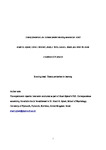Theory protection: do humans protect existing associative links?
| dc.contributor.author | Spicer, Stuart | |
| dc.contributor.author | Mitchell, Chris | |
| dc.contributor.author | Wills, Andy | |
| dc.contributor.author | Blake, K | |
| dc.contributor.author | Jones, Peter | |
| dc.date.accessioned | 2021-12-03T16:09:40Z | |
| dc.date.issued | 2022-02 | |
| dc.identifier.issn | 0097-7403 | |
| dc.identifier.issn | 2329-8464 | |
| dc.identifier.uri | http://hdl.handle.net/10026.1/18439 | |
| dc.description.abstract |
Theories of associative learning often propose that learning is proportional to prediction error, or the difference between expected events and those that occur. Spicer et al. (2020) suggested an alternative, that humans might instead selectively attribute surprising outcomes to cues that they are not confident about, to maintain cue-outcome associations about which they are more confident. Spicer et al. reported three predictive learning experiments, the results of which were consistent with their proposal ("theory protection") rather than a prediction error account (Rescorla, 2001). The four experiments reported here further test theory protection against a prediction error account. Experiments 3 and 4 also test the proposals of Holmes et al. (2019), who suggested a function mapping learning to performance that can explain Spicer et al.'s results using a prediction-error framework. In contrast to the previous study, these experiments were based on inhibition rather than excitation. Participants were trained with a set of cues (represented by letters), each of which was followed by the presence or absence of an outcome (represented by + or -). Following this, a cue that previously caused the outcome (A+) was placed in compound with another cue (B) with an ambiguous causal status (e.g., a novel cue in Experiment 1). This compound (AB-) did not cause the outcome. Participants always learned more about B in the second training phase, despite A always having the greater prediction error. In Experiments 3 and 4, a cue with no apparent prediction error was learned about more than a cue with a large prediction error. Experiment 4 tested participants' relative confidence about the causal status of cues A and B prior to the AB- stage, producing findings that are consistent with theory protection and inconsistent with the predictions of Rescorla, and Holmes et al. (PsycInfo Database Record (c) 2022 APA, all rights reserved). | |
| dc.format.extent | 1-16 | |
| dc.format.medium | ||
| dc.language | en | |
| dc.language.iso | en | |
| dc.publisher | American Psychological Association | |
| dc.subject | associative learning | |
| dc.subject | confidence | |
| dc.subject | prediction error | |
| dc.subject | theory protection | |
| dc.subject | uncertainty | |
| dc.title | Theory protection: do humans protect existing associative links? | |
| dc.type | journal-article | |
| dc.type | Journal Article | |
| plymouth.author-url | https://www.webofscience.com/api/gateway?GWVersion=2&SrcApp=PARTNER_APP&SrcAuth=LinksAMR&KeyUT=WOS:000753127400001&DestLinkType=FullRecord&DestApp=ALL_WOS&UsrCustomerID=11bb513d99f797142bcfeffcc58ea008 | |
| plymouth.issue | 1 | |
| plymouth.volume | 48 | |
| plymouth.publication-status | Published online | |
| plymouth.journal | Journal of Experimental Psychology: Animal Learning and Cognition | |
| dc.identifier.doi | 10.1037/xan0000314 | |
| plymouth.organisational-group | /Plymouth | |
| plymouth.organisational-group | /Plymouth/Admin Group - REF | |
| plymouth.organisational-group | /Plymouth/Admin Group - REF/REF Admin Group - FoH | |
| plymouth.organisational-group | /Plymouth/Faculty of Health | |
| plymouth.organisational-group | /Plymouth/Faculty of Health/Peninsula Medical School | |
| plymouth.organisational-group | /Plymouth/Faculty of Health/School of Psychology | |
| plymouth.organisational-group | /Plymouth/REF 2021 Researchers by UoA | |
| plymouth.organisational-group | /Plymouth/REF 2021 Researchers by UoA/UoA04 Psychology, Psychiatry and Neuroscience | |
| plymouth.organisational-group | /Plymouth/REF 2021 Researchers by UoA/UoA04 Psychology, Psychiatry and Neuroscience/UoA04 REF peer reviewers | |
| plymouth.organisational-group | /Plymouth/Research Groups | |
| plymouth.organisational-group | /Plymouth/Research Groups/Centre for Brain, Cognition and Behaviour (CBCB) | |
| plymouth.organisational-group | /Plymouth/Research Groups/Centre for Brain, Cognition and Behaviour (CBCB)/Cognition | |
| plymouth.organisational-group | /Plymouth/Research Groups/Institute of Health and Community | |
| plymouth.organisational-group | /Plymouth/Research Groups/Plymouth Institute of Health and Care Research (PIHR) | |
| plymouth.organisational-group | /Plymouth/Users by role | |
| plymouth.organisational-group | /Plymouth/Users by role/Academics | |
| dc.publisher.place | United States | |
| dcterms.dateAccepted | 2021-11-08 | |
| dc.rights.embargodate | 2022-2-16 | |
| dc.identifier.eissn | 2329-8464 | |
| dc.rights.embargoperiod | Not known | |
| rioxxterms.versionofrecord | 10.1037/xan0000314 | |
| rioxxterms.licenseref.uri | http://www.rioxx.net/licenses/all-rights-reserved | |
| rioxxterms.licenseref.startdate | 2022-02 | |
| rioxxterms.type | Journal Article/Review |


